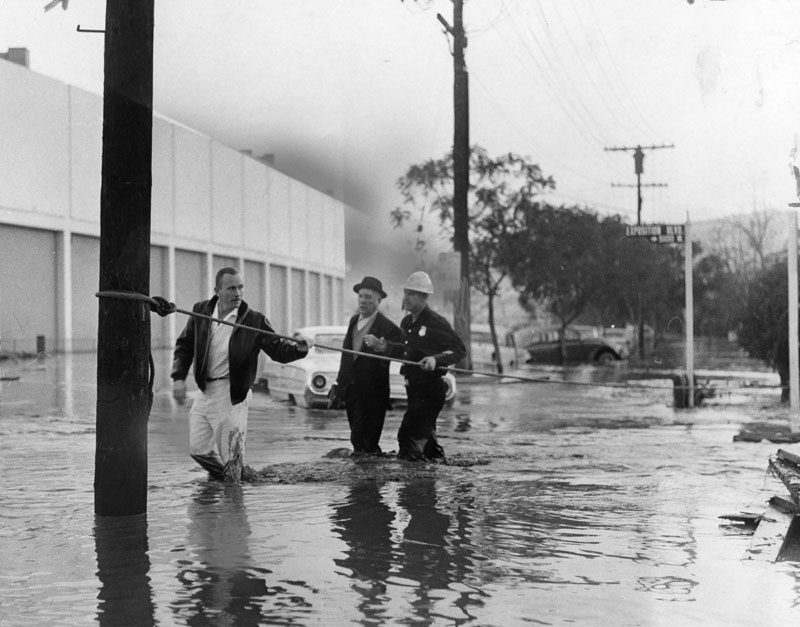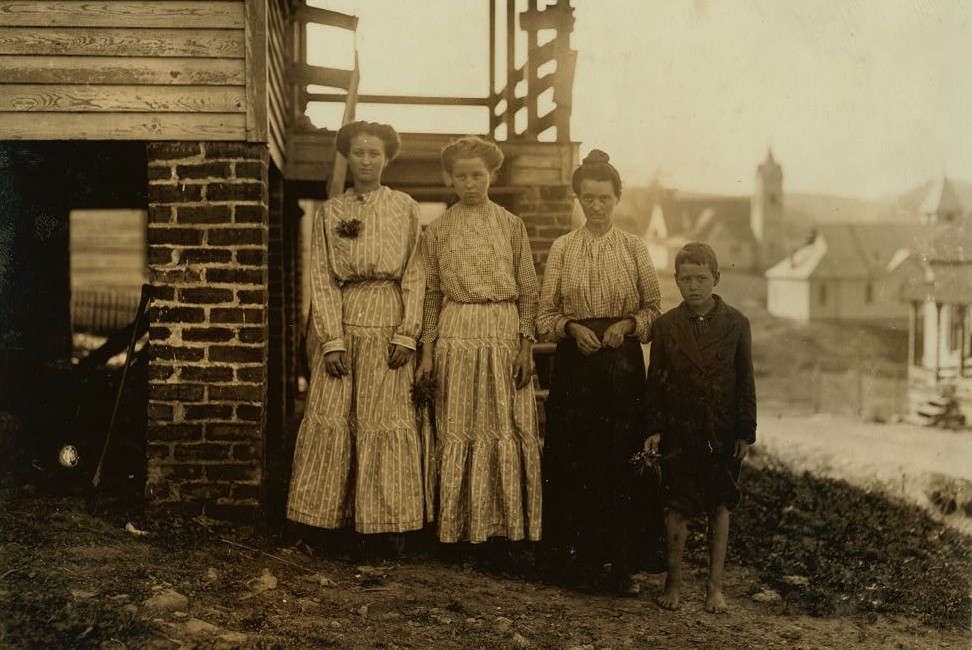Anecdotes for Connecticut Clockmaker
by
Francis Donovan
This life history was compiled and transcribed by the staff of the Folklore Project of the Federal Writers’ Project for the U.S. Works Progress (later Work Projects) Administration (WPA) from 1936-1940 Pseudonyms are often substituted for individuals and places named in the narrative texts.
December 12, 1938
“I forgot to tell you,” said he, “about the time Aaron caught the help looking out the windows. I forget what was going on — some kind of parade or somethin’, I s’pose — and old Aaron, he come along outside the shop this day, and there was all the help at the windows — not a durned one workin’ mind you — lookin’ out at whatever was goin’ on.
“Aaron got boilin’ mad when he saw them, and he goes in and he calls the foremen together and he asks them what’s the idee, can’t they keep the help to work?
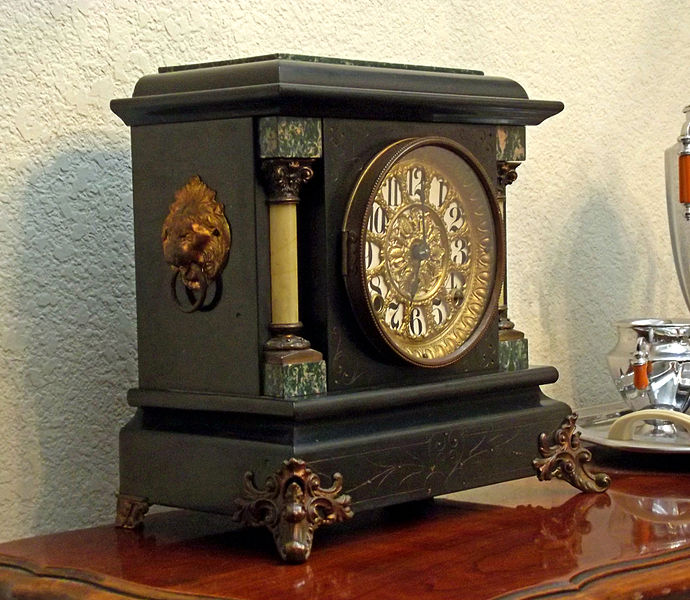 “Somebody says, ‘Well, you know how ’tis, Mr. Thomas, when the’s a parade or somethin’ — they just won’t stay at the benches.'”
“Somebody says, ‘Well, you know how ’tis, Mr. Thomas, when the’s a parade or somethin’ — they just won’t stay at the benches.'”
“‘Well’s’ says Aaron, ‘by gollies, we’ll see whether they will or not,” he says. So he calls Hen Wolcott, the old one armed painter, and he says, ‘Hen, go down to the Case shop and paint all those windows white that’re facin’ the street.'”
“All right,” says Hen, and he goes down to paint ’em. He got the work done all in one day, too, and old Aaron came by the next day and looked ’em over and he was satisfied.
“But that day Hen got a call from one of the foreman — one of the windows was busted, so he had to go down and fix it — put in a new pane. He got another one that afternoon and another the next morning, and two the day after that.
“So he went to Mr. Thomas and said, ‘Those white painted windows seem to be hoodooed, some way or ‘nother — they just won’t stay in.’
“‘How’s that?’ says Aaron.
“‘Don’t know,’ says Hen. ‘They been breakin’ right and left. Springs keep breakin’ and hittin’ the panes — the work just seems to fly out’n the boys’ hands. Never see nothin’ like it.'”
Old Aaron didn’t say nothin’ for a while. Then he says to Hen, ‘Maybe paintin’ those panes wasn’t such a good idea. Perhaps you better scrape ’em and we’ll see what happens.
“Well, sir, never a one got busted after that.”
“‘Nother time I remember Aaron scared the life out of Hen. It used to be a kind of storm signal when Aaron’s eyebrows went down. When he put on that frown that showed he was gettin’ mad. The’ used to be a lot of kiddin’ back and forth among the boys about Aaron’s eyebrows.
“Hen strolled into the office once and old Aaron was there, but he was kind of bent down lookin’ at some files and Hen didn’t see him. Levi Parsons Worked in the office, and Levi says to Hen: ‘Well, Mr. Wolcott, what can we do for you?’
“Oh, nothin’,” says Hen; “‘I just came in to see if the old man’s eyebrows was hangin’ down.” When old Aaron heard that he straightened right up and glared at Hen.
“Well, be they?’ he says. Hen didn’t answer, just dusted out of that office as fast as his feet would carry him.”
Aasron had the biggest funeral in town
“Aaron had the biggest funeral I ever see in this town. At ten o’clock that morning he was buried, all the help from the factories – every man, that is — went around and stood in front of his house — you couldn’t get within 500 yards of it. They all marched six abrest, behind the cortege and to the cemetery, to see the old man laid away. I guess there was at least 500 of them.
“They thought a lot of him because he thought a lot of them. When the panic was on — the company had about 90,000 of those old Nutmeg alarms over at the Marine shop and about 30,000 more in the storehouse — they got caught with all those on their hands. Seth E., in New York, he was all for closing the place down tight. But Aaron said no, he was going to keep shop open if he only had a dozen workin’, thought it would have a demoralizin’ effect if he closed. So he kept some workin’ right along, had ’em on two days a week.
“Business started pickin’ up in August, and Seth Thomas went on 40 hours a week. Over at Ingraham’s in Bristol, they was workin’ until nine-o’clock nights, and on top of that they got a standin’ order from some jobber for 20,000 clocks a month. They couldn’t take care of it, so they recommended Seth Thomas.
“They called Aaron to ask him if he could handle it. Says he: ‘I’ll have the first shipment on the train tomorrow morning.’ And it was, and in three months they’d worked off the whole order of 120,000.
* * * * *
Employed by Seth Thomas for 46 years
Antone Scheebel — German — employed by Seth Thomas for 46 years. Center Street. Mr. Scheebel is another of the old German clockmakers. His father in Germany employed several persons at the craft, though Scheebel did not learn the rudiments of the trade, strangely enough, until he came to this country. “My father was a clockmaker but”I wanted to work at something there was more money in,”said he; “so I became a chainsmith in the old country and worked at it for a few years. Then my brother over here, he wrote and told me to come to Thomaston, said he’s send me the money, so I ended up as a clockmaker after all.
“My father used to make the old wooden movements — I wish I had one now — he had his own business in the Black Forest. Twelve or fifteen people worked for him, right in our house. Sometimes I had to file counter pinions, or paint clocks or do repair work, but I never learned much about the trade, though I worked for a while in a clock factory in Furtwangen, too.
“I had relatives here , as I say, and so did my wife, so we were glad of the chance to come here and live. William T. Woodruff was president of the concern when I came to work, and I can tell you a story about him.
“He was a dressy sort of man, took considerable pride in his appearance. Each day he’d come to work with a carnation in his buttonhole. There was a fellow working there then named Sullivan who used to be on friendly terms with Woodruff — the only one in the shop that was — as far as I know, and he was greatly taken with a suit the old man used to wear. “So he went to the house one day and he said to Mrs. Woodruff, ‘The boss said for you to give me that suit he’s been wearing to the shop every day.’ She gave it to him without question, and I imagine Mr. Woodruff was a greatly surprised man when he came home and found it missing. No, I don’t think he ever said anything to Sullivan. Maybe he thought it was a good joke, or maybe he was too proud to make a fuss over it.
“I worked in the turning room most of the time. It was all hand-turned work and pretty tough, let me tell you. I spent as much as four hours turning one piece — a part for an escape wheel for a tower clock. I got a box here, sample work — spindles, sockets, collets, center pinions, all sizes and all lengths, let me show you.”
Mr. Scheebel brought out his samples — and this is an instance of the pride these old fellows took in their work for these particular parts in themselves are of no earthly use to him and he obviously cherishes them for sentimental reasons. He showed me several which he described as being particularly difficult pieces of work and spoke disparagingly of the spindles and pinions turned out today, many of them done by automatic machines.
******
He had another anecdote for me today, though he says he has little left in that remarkable memory he hasn’t told me. This one concerns a clock that was made for the Paris exposition,”There was a clock, one of their finest jobs, nickel plated–every bit of metal–and polished till you could see your face in any part of it. It had a Westminster chime that was one of the sweetest tones I ever heard. After the exposition they brought it back and I didn’t hear any more of it for a while. But a few years later they had some kind of a small exposition in St. Louis. I took a trip down that way and I stopped at St. Louis to see the exposition.”I wandered around for a bit looking at this that and the other, and not very much interested in anything, when I heard this chime clock. Says I to myself ‘There’s only one chime in the world that sounds like that.’ And upstairs I went in the direction the sound was coming from. Sure enough, there was the clock Seth Thomas had sent to Paris right at the head of the stairs.”
* * *
(Interview with George Potter)
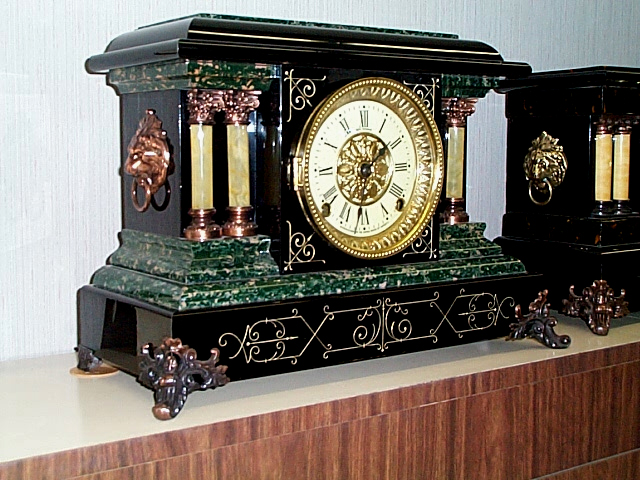
Mr. Potter was a member of the oldest families in the state
Mr. Potter in a member of one of the oldest families in this section of the state, cultured, well-read, deeply interested in and thoroughly familiar with the history of the Seth Thomas Clock Company. He has one of the finest collections of Seth Thomas Clocks of all types in Thomaston. He entered the company’s employ in the eighties and spent 23 years as an employe of the concern, leaving for other employment and returning several times. He was last with the company in 1932.
“When I first went to work for them,” he said, “they did all their trucking with horses. They had some of the finest draft horses you ever saw and company officials were proud of them. I remember that during the blizzard of ’88, when it appeared that we might be snowbound in the factory I was working at the old movement shop at the time. They sent the women home by horse and team, and they all got to their homes without mishap.
“In those days the town was experiencing a sort of boom, and one of the recurrent waves of immigration had its effect here. I remember in particular a young Scotchman named James Blaine who came here with his family. He was typically frugal and he had left behind with relatives a Seth Thomas clock which he had bought in Scotland. “Why should I bring one over there when I’m going to work for the company?” he asked his wife. But when he got here he found he had to pay more for the same model, even with the discount, allowed the help, than he had to pay in the old count.
Seth Thomas
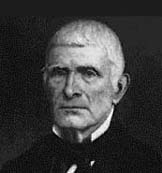
“You spoke of superstitions a while ago and I’ll tell you something that might generally be regarded as superstition but which anyone familiar with clock movements will vouch for as gospel truth. Clocks run faster in summer than they do in winter, and that’s due to the expansion of metal by the heat. I’ve regulated them for years and I know. You have to shorten up the rods and lower the pendulum on pendulum movements–a barely perceptible degree and yet it has to be done. The compensating rod on the old movements had mercury in it–was made to allow for the difference in temperature without the necessity of regulation.
“I understand that during the past few years there have been revolutionary changes in clock making methods. Maybe its for the best, and yet I challenge anyone to show me finer clocks and better timepieces than the old Seth Thomases in my collection.
“I don’t recall anything that might be of interest to you in the way of anecdote except one little story that has to do with the late William T. Woodruff who was once president of the company.
“He was the epitome of dignity, a self-made man and extremely proud of it and with no more sense of humor than an oyster. He dressed the part of a big executive, was gruff in his relations with his subordinates and had never been known to laugh under any circumstances.
“I remember when this incident happened it was a holiday eve, the day before the Fourth of July, I believe, and perhaps the holiday spirit had emboldened the help somewhat. It was raining and Mr. Woodruff carried an umbrella and wore his rubbers. There was a hat-rack right outside the door of his office, which incidentally, adjoined the assembling room, and it was his custom to leave his hat, umbrella and rubbers there.
“Well Mr. Woodruff came out shortly before closing time, as was his invariable habit, grabbed his hat and umbrella and slipped his feet into his rubbers. He started walking, but the rubbers stayed behind. Somebody had nailed them to the floor. The old man roared in his best style and the air around there fairly crackled.
But everybody looked up from work with an air of surprise and though he stood and glared at each man in turn for a few minutes he couldn’t find out who did it.
“But he would have fired him if he’d caught him, for he was the kind of man who wouldn’t stand for any nonsense.
We had only numbers for clocks
“We had only numbers for the clocks. There were 103’s and 89’s and 112’s and so on. Only in cases where the movements were made for some other company were they known to the help by names. For example, those made for the Taylor Instrument Company were called Taylors.”
Mr. Potter related a story which he said might be illustrative of superstition on the part of at least one clockmaker, but first exacted my solemn promise that if it were used in print his name would not be mentioned in connection with it. It concerned an ear-timer named “Buddy” Keen or Kerr who had a fetish of some kind tacked above his bench–whether it was a small statue, a doll or a billiken he had won someplace Mr. Potter wasn’t sure–but Kerr was obsessed with the idea that the thing was his lucky piece. He thought it had some definite bearing on his work. Somebody stole it one day and never brought it back and Kerr became a nervous wreck. He resigned his job a few weeks later and went elsewhere to work, though Mr. Potter says he is still working at his trade and has apparently forgotten the incident.
* * *
(Interview with Charles Saum) AaronThomas was a great hand for playing tricks, but all in a spirit of fun, there wasn’t anything mean about them. Just to give you an example, I remember one time he was coming through our room and he stopped at Farrell Fox’s bench. Farrell had a new razor he hadn’t used at all yet and he had it on a shelf up above his bench, brand-new box and all.”The old man spotted the razor and he stopped and took it down from the shelf.
“Mind if I look at it?” says he. {Begin handwritten}”
“Go right ahead and look,” says Farrell laughing, I ain’t using it on your time.”
So Aaron took it out of the box and drew his thumb along the edge.”It ain’t very sharp, Farrell,” he says. “Maybe I could sharpen it up a bit for you.”
“Well, all right,” says Farrell, but he doesn’t care much for the idea of anybody monkeying with his new razor. So the old man takes it over to a grindstone we had and goes to work on it, while Farrell was sitting on the anxious seat. Pretty soon he brings it back and hands it to Farrell as solemn as an owl.
“There you are, Farrell,” he says;” better than when it came out of the factory. It was honed right down to nothing. Farrell’s face dropped about a foot, but he didn’t say nothing and the old man walked away, while the rest of us had a good laugh. But the next day Aaron sent up a brand now razor, just like the one he’d spoiled. That’s the kind of thing that went on in those days. There was more real friendship between the men and the bosses.”
We used to have a stock room to hide in
“We used to have a stock room that was made to order for people to hide in. Aaron would catch some of the men loafing around there ‘most every day, but he was cute about it. He knew they were there, usually hiding behind big piles of cases and he got so he was wise to all the good hiding places. Some of them even used to sleep there. So he’d walk through the room whistling or humming and make believe he was going out the other door. But he’d jump behind a case as quick as a flash and work his way up along the back of the room. Every ten steps or so he’d scare up a man, just like he was flushing partridge. When he caught ’em he’d just give ’em a good boot in the tail and holler, “Get the hell back where you belong and don’t let me catch you out here again or by Godfreys I’ll fire you!” But he never fired anybody and he never had any particular watch set over the stock room? They used to say he enjoyed it, made kind of a game out of it.”
“None of that kind of stuff goes on these days. Everything is business. And with all their business ways they don’t make the clocks they used to make. Others have told you the same thing? Well, it’s true. They don’t make the clocks and they haven’t got the type of workman they used to have.”
“Clock making isn’t the trade it used to be. Too much speed and efficiency, as they call it. You can’t tell ’em anything either. Men that have worked there all their lives and know the business from the inside out have to take orders from young whippersnappers who don’t know an escapement from a balance wheel.”
“‘You go to see Art Botsford, son, he’ll tell you more in ten minutes about old time clock making than I can tell you in an hour.’
It might be well to remark here that Mr. Saum’s unconcealed bitterness toward the new regime in clock making seems to be general among the old timers throughout this clock making community.
For 125 years clock making has been the mainstay of the town, and the name Seth Thomas, natives will tell you with pride, has become throughout most of the civilized world synonomous (sic) with clock perfection. From generation to generation, up to the World War period and possibly a little after, clock makers proud of their craft have passed on their knowledge father to son and the highest possible praise of a man was to say “He is a good clockmaker.” Introduction of machinery and the abolition of many of the ancient methods and operations has brought about a drastic change and the old clock makers are bewildered and resentful. Nothing will convince them that the product of the present day is not inferior to the clock made 50 years ago and it may be that they are right.
* * *
(Interview with Arthur Botsford)
“Well sir, I don’t think there’s much more I can tell you about the old days. You know all about the history of the company, or what you don’t know you can find easy enough in books. I take it you don’t want that routine stuff.
“But it might freshen up my memory a little to recall some of it. When old Seth died, Aaron became president; everybody can tell you stories about him, but they ain’t many can tell you about Seth because there’s no one around that knew him. But I heard my father tell many’s the story about him, if I could just remember them all. There’s one, I don’t know if you’d want it or not, because it’s a mite salty.”
Mr. Botsford then related the following little Rabelaisian incident which may or may not be of value:
“Seems ’twas a long walk to the johnny from the room where my father worked, and at noon hour, just before they went back to their benches, they had a habit of relieving themselves at a small door which opened onto the back yard. Right below the door was a pile of choice lumber, and old Seth he heard about what was going on, and he give strict orders that anyone caught in the act was to be fired right off.
“That stopped the practice, all right, all right, but one day a few months later, one of the boys had the urge and instead of running ‘way up to the right place he opened the door.
“There was old Seth as big as life and twice as nasty, using that lumber pile for the very purpose he had forbidden. When he saw the feller lookin’ at him, he roared: ‘Get back in there you so-and-so. I know what you was stickin’ your head out there for. Just remember I’m payin’ for this lumber and I can do what I damn please with it —you can’t.’
* * *
A man named Prince lived in the house next to gasoline station
“When my father went to work along in the fifties, a man named Prince was the Superintendent. He used to live in that house right next to the gasoline station, across from the company’s main plant on South Main street there.
“Prince had the reputation of being kind of a close fisted person. He was fond of apples–had a whole orchard of them in back of his house. He used to come in the shop every day eating apples, and the boys noticed they were always carefully sliced in places where they’d been specked.
“Prince used to keep them in his cellar, and he always took the bad ones to eat, and cut out the rotten places. It was years before he found out that by doing that he never had any good ones. The boys said he was mortified most to death, and after that he took them as they came and gave himself the treat of eating a good one ever so often.
“They had a custom in them days–the clockmakers did–and its a cryin’ shame it ever went out of style–of pitching in and helping each other in the tight places. You know that little old high house up on Skunk Hill –looks like it was built on stilts. That house was built by a man named W. H. Norwall, and everybody–or most everybody–in the shop gave him a day’s work. My father did for one.’
“How’s that? Why, the man couldn’t afford to pay for having it built, so the boys all chipped in and helped him out the only way they could–with the work of their hands. Yessir, there was lots of that kind of thing in the old days. If anyone was sick, his friends all offered to help the family watch over him–many a night my father sat up with sick folks.”
“They was mostly all Yankees here then, you can tell by the names in this old book (Mr. Botsford thumbs the leaves over, reads some of the names) “There’s a few Irish and Germans here–most of the rest though are Yanks. I can remember how some of these old fellows looked, though I was only a boy when I knew them.”
“There’s a name–Norton–he came here to be superintendent of the cotton mill, and his son–he’s a little older than me, he worked in the clock shop for years. He wrote a book on his life experiences some time ago–understand he paid for the printing himself–and he sent me a complimentary copy.”
“It mentions the old bell on top of the cotton mill that used to summon the workers to the shop and release them, too, and toll the curfew every night–yes we used to have curfew here. Norton had a sentimental feeling for that old bell. And so have I. It lies down under the old bank building on Elm street to this day, and it was Norton’s idea, and mine before him, if I do say it myself, that the old bell should be brought to light and set up some place where people could see it, and some kind of a proper inscription placed on it. For it played a mighty big part in the early history of this here town, and there was something kinder about it, in a way, than these damn whistles.
“I don’t know as you want to know any of the Thomaston history, though that’s kind of background for the clock industry. I told you about the Potters and their gun factory. Maybe you heard about that place down in the Reynolds Bridge meadows where Indians burned a fellow named Scott at the stake. But I’ll bet you didn’t know that the first matches–Diamond matches–were made near the Wigwam reservoir.”
“And that the Terry family–the ones that used to make clocks before Seth Thomas–used to own a big woolen mill south of the Knife Company. And Terry’s bridge, by the way, was the first iron bridge across the Naugatuck, and it’s still standing. That’s something for you to write.”
Mr. Botsford seems to be running dry of information–has a tendency toward repetition and dwells interminably on unimportant details. But he is perfectly willing to answer questions and is one of the most cooperative of the men with whom I have talked so far. He is in fact, eager, to impart information. Any further suggestions for Mr. Botsford?”
